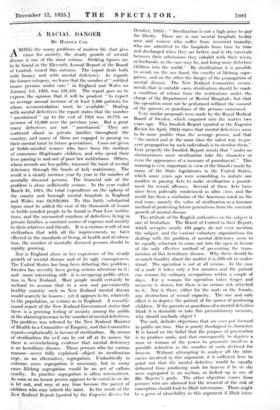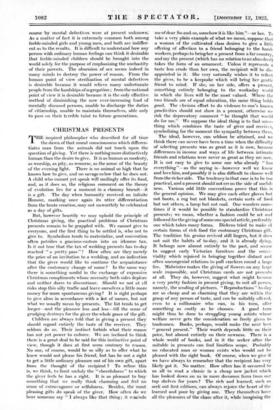RACIAL DANGER
BY HAROLD COX
AMONG the. many problems of modern life that give - cause for anxiety, the steady growth of mental disease is one of the most serious. Striking figures are, to be-found in the Eleventh Annual Report of _the Board of Controi,f issued this autumn. --The report deals bOth with lunacy and with mental deficiency. As regards. the former category, we learn that the number of "._ notified insane persons under care " in England and Wales on January 1st, 1925, was 131,551. The 'report goes on to express the opinion that it will be prudent "to expect. an average annual increase of at leaSt 2,500 patients for whom accommodation must be available." Dealing.
with mental defectives the _report states that the number `_` ascertained " up to the • end of 1924 was 48,778, an increase of 12,300 over the previous year. But a great many defectives, are not " ascertained." They are scattered about in private :families throughout the country, and many of them are engaged in passing on their mental taint to future generations. Cases are given of feeble-minded women who have been the mothers. of numerous illegitimate children, and who spend their lives passing in and out of-poor law institutions. Others, whose records are less public, transmit the taint of mental deficiency: through the bonds of holy matrimony. The result is a steady increase year by year in the number of mentally diseased persons. The financial side of the problem is alone sufficiently serious.: In the year ended March 31, 1924, the total expenditure on the upkeep of the county and borough mental hospitals in England and Wales was £6,953,804. To this fairly substantial figure must be added- the - eost -of-the thousands of -insane or feeble-minded people to be found in Poor Law institu- tions, and the uncounted numbers of defectives living in private families, a constant source of expense and anxiety to their relativesand friends. It is-a curious result of our civilization that with all the improvements we have effected in the standards of living, of health and of educa- tion, the number of mentally diseased persons should he rapidly growing.
Nor is England alone in her experience of the steady growth of mental disease and of its ugly consequences. The United States. has long been debating this problem ; Sweden has recently been giving serious attention to it ; and—more interesting still —it is occupying public atten- tion in New Zealand. Most people would certainly be inclined to . assume that in a_ new and pre-eminently healthy country such as New Zealand mental disease would scarcely be known ; yet it appears to be, relatively to the population, - as serious as in England. A recently- issued report of the New Zealand Government states that there is a growing feeling of anxiety among the public at the alarming increase in the number-of mental defectives. The problem was referred by the New Zealand Minister of Health to a Committee of Enquiry, and this Committee reports emphatically in favour of sterilization. By means of sterilization the evil can be cut off at its source, for there is overwhelming evidence that mental deficiency. is an hereditary disease. Those persons who for various reasons—never fully explained—object to sterilization, urge, as an alternative, segregation. Undoubtedly in extreme cases segregation is necessary, but in many cases lifelong segregation _would be an act of callous cruelty. In practice segregation is , often intermittent. As soon as an insane person appears to be cured he or she is let out, and may at any time become the parent of children who may inherit the taint. In the words of the NeW Zealand Report (quoted by the Eugenics Rerieu. for October, 1925) : " Sterilization is not a high, price to pay for liberty. There are in our mental hospitals to-day. • men and women who suffer from recurrent insanity, who are admitted to the hospitals from time to time and discharged when they are better, and in the intervals between their admissions they cohabit with their wives, or husbands, as the ease may be; and bring more defective children into the world." By Sterilization it is pOsSible to avoid, on the one hand; the cruelty of lifelong segre-- gation, and on the other the danger of the propagation of mental disease. The New Zealand CoMMittee recom-. Mends that in suitable cases sterilization Should be Made. a condition of release from the institutions under the Charge of the Department of Mental Hospitals, Init that the operation must not be performed without the consent of the parents or guardians of the persons concerned. Very similar proposals were made by the Royal Medical Board of Sweden, which enquired into the matter two years ago. This Swedish Report (quoted in the Eugenics Review for April, 1924) states that mental defectives seem to be more prolific than the average person, and that " the easiest and at the same time the safest way to pre- vent propagation by such individuals is to sterilize them."- Very properly the Swedish Report insists that " under no circumstances must sterilization take the character or even the appearance of a measure of punishment." This warning is very important in view of the blunder made by many of the State legislatures in the United States, • which some years ago were scrambling to imitate one another in passing Acts to make sterilization a punish- ment for sexual offences. Several of these Acts have since been judicially condemned as ultra vires, and the result has been a confusion of the American mind on the real issne, namely, the value of sterilization as, a humane. method of protecting future generations fronithe constant growth of mental disease.
The attitude of the English authorities on the subject is one of hesitation. The Board of Control in their Report, which occupies nearly 450 pages, do not even mention the subject, and the various voluntary organizations for dealing with the problem of mental deficiency seem to be equally reluctant to come out into the open in favour of the only effective method of preventing the trans- mission of this hereditary disease. Why there should be so much timidity about the matter it is difficult to under- stand. The operation is not at all serious. In the case of a male it takes only a few minutes and the patient can resume his ordinary occupations within a couple of days. For a woman the operation takes longer and recovery is slower, but there is no serious risk attached- to it. Nor is there, either for the male or the female, any destruction of sexual capacity. The one and only effect is to deprive the patient of the power of producing children. If the parents or guardians of a mental defective think it is desirable to take this precautionary measure, why should anybody object ?
The only definite objections that are ever put forward in public are two. One is purely theological in character. It is based on the belief that the purpose of procreation is to produce souls, and that consequently to deprive a man or woman of the power to procreate involves a possible redneti9n in the number of souls destined for heaven. Without attempting to analyse all the intri- cacies involved in this argument, it is sufficient here to.
point out that the mental defective would be equally debarred from producing souls for heaven if he or she were segregated in an asylum, or locked up in one of His Majesty's gaols. The other objection comes from persons who are alarmed lest the removal of the risk of conception should lead to illicit intercourse. There might be a germ of plausibility in this argument if illicit inter- course by mental defectives were at present unknown: As a matter of fact it is extremely common both among feeble-minded girls and young men, and both are indiffer- ent as to the results. It is difficult to understand how any person with ordinary human feelings can think it desirable, that feeble-minded children should be brought into the world solely for the purpose of emphasizing the unehastity of their parents. The obsession of sex seems indeed in many minds to destroy the power of reason. From the human point of view sterilization of mental defectives is desirable because it would relieve many unfortunate people from the hardships of segregation ; frointhe national: point of view it is desirable because it is the only effective. method of diminishing the now ever-increasing load of mentally diseased persons, unable to discharge the duties of citizenship, unable to maintain themselves, able only to pass on their terrible taint to future generations.























































 Previous page
Previous page